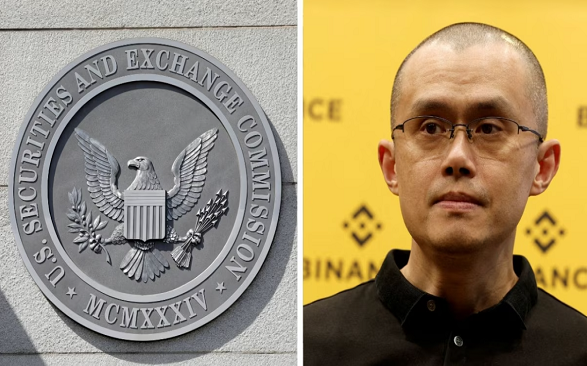Edison Irabor
Binance, the world’s biggest crypto exchange, has described the U.S SEC’s recent enforcement action against it as “regulation by enforcement” aimed at unilaterally defining crypto market structure. Binance considers the action unfortunate, “unilateral”, “misguided”, and an “overreach” which Binance is “prepared to fight … to the full extent of the law”.
The U.S SEC charges apply to Binance Holdings Ltd. (Binance), U.S-based affiliate, BAM Trading Services Inc. (BAM Trading), which operates Binance.US; and their founder, Changpeng Zhao (CZ).
Three major reasons behind Binance’s accusations against the U.S SEC
1. The U.S SEC’s hurry to enforce as a first step rather than engage
First, Binance expressed its disappointment with the U.S SEC for choosing to file a complaint against Binance where it is seeking, among other remedies, purported emergency relief. According to Binance, Binance has actively cooperated with the U.S SEC’s investigations and has worked hard to answer its questions and address concerns. Recently, Binance points out, both parties “have engaged in extensive good-faith discussions to reach a negotiated settlement to resolve their investigations”. But despite Binance’s efforts, the U.S SEC “abandoned that process and instead chose to act unilaterally and litigate”. Binance feels “disheartened by that choice”.
Binance maintains that while it takes the U.S SEC’s allegations seriously, it does not see why SEC should be suing Binance, “let alone on an emergency basis”. Reinforcing the position many other crypto operators, including Coinbase, have been making, Binance pointed out that “the SEC’s refusal to productively engage with [Binance] is just another example of the Commission’s misguided and conscious refusal to provide much-needed clarity and guidance to the digital asset industry”. Emphasizing this point, Binance stated:
Today’s action is another in a line of examples where, as with other crypto projects facing similar suits, the Commission has determined to regulate with the blunt weapons of enforcement and litigation rather than the thoughtful, nuanced approach demanded by this dynamic and complex technology. Unilaterally labeling certain tokens and services as securities – even ones over which other U.S. authorities have asserted jurisdiction – only compounds these problems.
2. The U.S SEC’s approach of regulation by enforcement, allegedly.
Second, Binance expressed surprise about the U.S SEC’s action of “regulation by enforcement”.
Binance believes that this is in stark contrast to what should be “America’s role as a global hub for financial innovation and leadership” in a space where digital asset laws “remain largely undeveloped in much of the world”. Binance advocates an “effective regulatory framework” that is based on “collaborative, transparent, and thoughtful policy engagement”, a path Binance believes “the SEC has abandoned”.
3. The U.S SEC’s action does not prioritize investors, but a rush for jurisdictional authority over the crypto industry.
Binance alleges that “the SEC’s actions here appear to be in service of an effort to rush to claim jurisdictional ground from other regulators – and investors do not appear to be the SEC’s priority”.
As far as Binance understands it, the U.S SEC is taking enforcement actions against Binance because of Binances’s “size and global name recognition”. As put by Binance, “Binance is an easy target now caught in the middle of a U.S. regulatory tug-of-war”:
It seems based on these developments that the SEC’s goal here was never to protect investors; if that were truly the case, the Staff would have thoughtfully engaged with us on the facts and in our efforts to demonstrate the safety and security of the Binance.US platform. The SEC’s real intent here, instead, appears to be to make headlines.
In March 2023, the Commodities Futures Trading Commission (CFTC), a U.S regulator that has been fighting the U.S SEC concerning jurisdiction over the crypto industry, also sued Binance. According to the CFTC, it charged Binance Holdings Limited, Binance Holdings (IE) Limited, and Binance (Services) Holdings Limited (together, “Binance”) for operating “the Binance centralized digital asset trading platform along with numerous other corporate vehicles through an intentionally opaque common enterprise, with Zhao at the helm as Binance’s owner and chief executive officer.” Allegedly, Binance “chose to knowingly disregard applicable provisions of the [Commodity Exchange Act (CEA)] while engaging in a calculated strategy of regulatory arbitrage to their commercial benefit”.
With both the CFTC and SEC asserting their jurisdiction in the crypto space, it appears apparent that clarity (or at least additional clarity) will help operators like Binance understand whether a crypto asset is under the CFTC’s authority as a commodity or the U.S SEC’s authority as a security.
Meanwhile, Binance denies allegations about user funds being at risk on its platform.
Binance has denied “any allegations that user assets on the Binance.US platform have ever been at risk”. Such allegations “are simply wrong, and there is zero justification for the Staff’s action in light of the ample time the Staff has had to conduct their investigation”.
Binance asserts that “all user assets on Binance and Binance affiliate platforms, including Binance.US, are safe and secure. Binance says it “will vigorously defend against any allegations to the contrary”.
Binance promises to continue to engage regulators, collaborate with operators, and keep its platform safe and trusted.
Though “Binance is not a U.S. exchange” and consequently “the SEC’s actions are limited in reach”, Binance stated that it stands with digital asset market participants in the U.S. “in opposition to the SEC’s latest overreach”. Binance declared that it is “prepared to fight it to the full extent of the law”.
Binance expressed its commitment to “productive engagement to ensure the next generation of cryptocurrency regulation fosters innovation while implementing and ensuring important consumer protections”. It promised to “work alongside industry partners to defend this important technology from misguided lawsuits”, ensuring that it delivers “a safe and trusted platform” for its users.
Interestingly, Binance attorneys have revealed that U.S. SEC chair, Gary Gensler, offered to serve as Binance advisor in 2019. This is according to documents filed in the ongoing court suit against Binance. Gensler made the alleged offer in March 2019, when he was still a professor at Practice of Global Economics and Management, Massachusetts Institute of Technology’s Sloan School of Management.
The crypto market has reacted since the news of SEC;s action against Binance broke out, declining in value. At the time the news broke out, bitcoin (BTC) and Ethereum (ETH) prices fell by 2.5%. Other crypto assets experienced more losses, including Binance Coin (BNB) down by almost 15% week-to-date.
Read also: Why exactly the U.S SEC sued Binance, the biggest crypto exchange in the world, and Zhao
Discover more from Crypto Asset Buyer
Subscribe to get the latest posts sent to your email.





